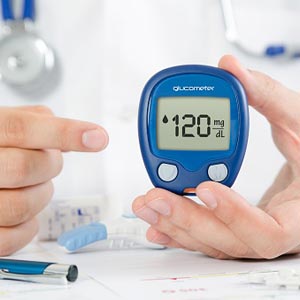By Bob Livingston
can have on blood sugar

I'd be willing to bet that — if you're not living with it yourself — you know at least one person who is.
I remember the day my friend Martin was diagnosed. He was surprised, but, looking back on it with an open mind, he knew he didn't develop the condition overnight.
He had eaten, sat and stressed his way to the disease gradually. His love of sodas and fast food, lack of exercise and constant stress had built up over the years until his body just couldn't fight it anymore.
He had become insulin resistant.
Insulin is a hormone produced by your body. It's what makes sure your cells are able to use sugar in the food you eat to create the energy to power your body. But when you become insulin resistant, like my dad, your cells can no longer absorb or use that sugar, so it sits in your bloodstream and builds up.
A diet that subjects you to sugar spikes, not getting enough exercise and stress all contribute to insulin resistance.
But there's something else connected to diabetes that you may not have considered: free radicals.
You've probably heard of them, they're a hot topic in conversations ranging from cancer prevention to slowing the effects of aging. They're molecules that rob other molecules in your body of electrons (you know, that negatively charged particle you remember from your old high school days). When a free radical steals an electron, it turns its victim molecule into what's called a reactive oxygen species.
These reactive oxygen species then cause DNA damage, premature aging and insulin resistance.
If free radicals and their resulting reactive oxygen species cause insulin resistance, could an antioxidant known to combat free radical damage help in the fight against blood sugar problems?
It turns out that as the CoQ10 levels in tissues got lower, insulin resistance got higher. More reactive oxygen species formed in cells that didn't have enough CoQ10.
In other words, if your body doesn't have enough CoQ10, you're more likely to experience free radical damage and end up with insulin resistance that can lead to diabetes.
When normal CoQ10 levels were restored, insulin resistance was completely reversed. That's right, the damage wasn't permanent.
The addition of CoQ10 could reset the tissues and help cells to start utilizing sugar properly again instead of allowing it to build up in the bloodstream.
Insulin resistance doesn't happen overnight — it's a long road. But the good news is that you can do something about it.
Lifestyle changes, like eating right, exercising and cutting down on the stress can make a significant impact.
As far as diet goes, you'll want to avoid foods that spike your blood sugar, like sugar and carbs. Go for fiber- and nutrient-rich foods and eat more of the foods that will supply CoQ10, like dark leafy greens, nuts, shellfish and organ meats like liver.
Of course you can also supplement to get the CoQ10 you need. The CoQ10 supplement I prefer is Peak CoQSol10 CF™ for two reasons.
First, it's made using ubiquinol, a natural antioxidant form of CoQ10, that's highly absorbable.
And second, because it's crystal-free. This second part is vital since your small intestine can't absorb the crystals found in so many CoQ10 supplements.
Sources:
niddk.
medicalxpress.



No comments:
Post a Comment